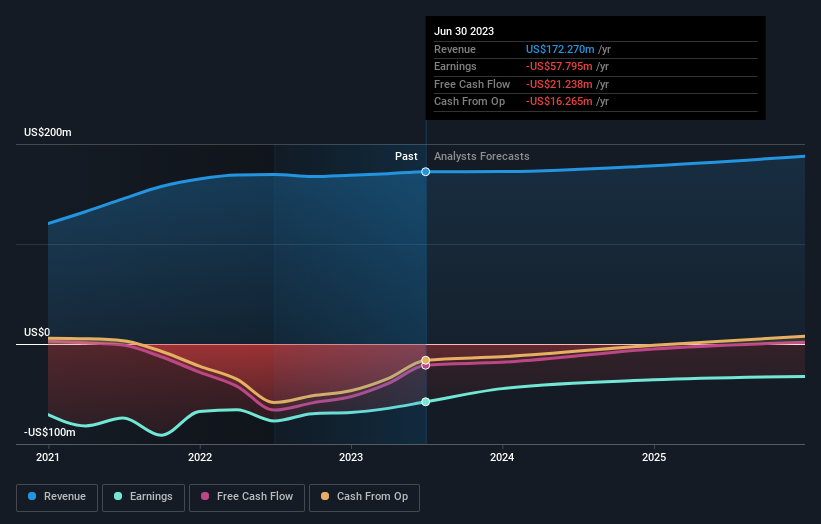- United States
- /
- Software
- /
- NasdaqGS:KLTR
Kaltura, Inc. (NASDAQ:KLTR) Second-Quarter Results Just Came Out: Here's What Analysts Are Forecasting For This Year

It's been a good week for Kaltura, Inc. (NASDAQ:KLTR) shareholders, because the company has just released its latest second-quarter results, and the shares gained 7.0% to US$2.14. Revenues came in at US$44m, in line with forecasts and the company reported a statutory loss of US$0.08 per share, roughly in line with expectations. The analysts typically update their forecasts at each earnings report, and we can judge from their estimates whether their view of the company has changed or if there are any new concerns to be aware of. Readers will be glad to know we've aggregated the latest statutory forecasts to see whether the analysts have changed their mind on Kaltura after the latest results.
See our latest analysis for Kaltura

Following last week's earnings report, Kaltura's nine analysts are forecasting 2023 revenues to be US$172.4m, approximately in line with the last 12 months. The loss per share is expected to greatly reduce in the near future, narrowing 22% to US$0.32. Before this earnings announcement, the analysts had been modelling revenues of US$171.9m and losses of US$0.32 per share in 2023.
As a result there was no major change to the consensus price target of US$3.07, implying that the business is trading roughly in line with expectations despite ongoing losses. That's not the only conclusion we can draw from this data however, as some investors also like to consider the spread in estimates when evaluating analyst price targets. The most optimistic Kaltura analyst has a price target of US$5.00 per share, while the most pessimistic values it at US$1.75. As you can see the range of estimates is wide, with the lowest valuation coming in at less than half the most bullish estimate, suggesting there are some strongly diverging views on how analysts think this business will perform. With this in mind, we wouldn't rely too heavily the consensus price target, as it is just an average and analysts clearly have some deeply divergent views on the business.
Looking at the bigger picture now, one of the ways we can make sense of these forecasts is to see how they measure up against both past performance and industry growth estimates. We would highlight that Kaltura's revenue growth is expected to slow, with the forecast 0.2% annualised growth rate until the end of 2023 being well below the historical 1.7% growth over the last year. By way of comparison, the other companies in this industry with analyst coverage are forecast to grow their revenue at 12% per year. Factoring in the forecast slowdown in growth, it seems obvious that Kaltura is also expected to grow slower than other industry participants.
The Bottom Line
The most obvious conclusion is that the analysts made no changes to their forecasts for a loss next year. On the plus side, there were no major changes to revenue estimates; although forecasts imply they will perform worse than the wider industry. The consensus price target held steady at US$3.07, with the latest estimates not enough to have an impact on their price targets.
Keeping that in mind, we still think that the longer term trajectory of the business is much more important for investors to consider. We have forecasts for Kaltura going out to 2025, and you can see them free on our platform here.
And what about risks? Every company has them, and we've spotted 2 warning signs for Kaltura you should know about.
Valuation is complex, but we're here to simplify it.
Discover if Kaltura might be undervalued or overvalued with our detailed analysis, featuring fair value estimates, potential risks, dividends, insider trades, and its financial condition.
Access Free AnalysisHave feedback on this article? Concerned about the content? Get in touch with us directly. Alternatively, email editorial-team (at) simplywallst.com.
This article by Simply Wall St is general in nature. We provide commentary based on historical data and analyst forecasts only using an unbiased methodology and our articles are not intended to be financial advice. It does not constitute a recommendation to buy or sell any stock, and does not take account of your objectives, or your financial situation. We aim to bring you long-term focused analysis driven by fundamental data. Note that our analysis may not factor in the latest price-sensitive company announcements or qualitative material. Simply Wall St has no position in any stocks mentioned.
About NasdaqGS:KLTR
Kaltura
Provides various software-as-a-service (SaaS) products and solutions and a platform-as-a-service (PaaS) in the United States, Europe, the Middle East, Africa, and internationally.
Flawless balance sheet and undervalued.
Similar Companies
Market Insights
Community Narratives




